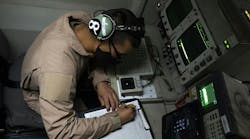By John McHale
RALEIGH, N.C. — Cetia, a Thomson-CSF company based in Toulon, France, and Matrix have merged to form an international company — to be called Cetia — that focuses on developing rugged, commercial-off-the-shelf (COTS) VMEbus single-board computers.
The new company is now about the third largest supplier of VMEbus single-board computers to the military behind Radstone Technology in Towcester, England, and the largest, DY 4 Systems in Kanata, Ontario, says Ray Alderman, executive director of the VME International Trade Association in Scottsdale, Ariz., and a former part owner of Matrix. Radstone does not have any manufacturing in the U.S., Alderman says.
"The beauty of this merger is in the quality as well as the variety of services we now will be able to provide to our clients," says David Mosier, United States vice chairman of the new company. "Our combined operations will provide outstanding local manufacturing and support in North America and Europe. Customers can expect diverse, quality products, and unparalleled support from project inception to deployment."
Being part of such a large company will enable Cetia and Matrix to participate in platforms that they were unable to as separate and smaller entities, says George Schreck, vice president of engineering at the new company.
Schreck declined to comment on any specific contracts that are resulting from the merger.
Cetia needed a larger manufacturing presence in the U.S. and Matrix had just installed a new manufacturing line in Raleigh and needed to pump volume through it — so the merger was a perfect match, Alderman explains. The merger also gives Cetia a greater inroad into the U.S. military board market, which makes up the bulk of the military board market worldwide, he adds.
The new company can address Intel and Motorola customers with Cetia's PowerPC-based products and Matrix's Pentium-based products, Schreck explains. However, the new company will remain focused on board, I/O, and enclosure products, he says. Cetia has no plans to launch into system-level designs on an application level, Schreck adds.
Cetia's Ruggedizer technology and the Matrix work on multilayer thermal heat sink designs also makes the new company strong in rugged technology, Alderman says.
"The merger with Matrix will allow us to provide our customers with products and complementary services for all their real-time, harsh environment needs," says Yvon Peresse, chief executive officer and president of Cetia S.A. "We have become a one-stop multi-domestic operation with one of the broadest product offerings in the industry, and our joined forces will result in an improved quality of service for our customers."
Cetia's new North American headquarters will be moved from Burlington, Mass., to Raleigh, N.C., Schreck says.


